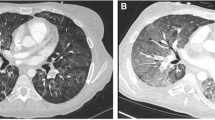Abstract
Acute postnatal pulmonary oedema due to transient myocardial dysfunction is an uncommon cause of respiratory distress in neonates. Among 11,732 liveborns we observed 3 term neonates with this condition requiring mechanical ventilation. After a delivery mildly to moderately suggestive of subpartum hypoxia, good adaptation and a short symptom free interval all three infants presented with tachydyspnoea, cyanosis, haemorrhagic pulmonary secretions at intubation and pleural effusions, pulmonary venous congestion and patchy alveolar opacities in the first chest radiograph. No evidence of hypoxic-ischaemic encephalopathy was present. The initial need for high ventilatory support and high FiO2 was followed by rapid recovery after only a couple of hours. In two cases an underlying transient myocardial dysfunction could be demonstrated by echocardiography.
Conclusion Pulmonary oedema due to transient myocardial dysfunction can be a rare cause in the differential diagnosis of respiratory distress of the newborn. Myocardial impairment after probable hypoxia can be present without concomitant encephalopathy.
Similar content being viewed by others
Author information
Authors and Affiliations
Additional information
Received: 9 January 1997 and in revised form: 18 May 1997 / Accepted: 21 May 1997
Rights and permissions
About this article
Cite this article
Stastny, B., Kind, C. Acute pulmonary oedema due to transient myocardial dysfunction: an uncommon cause of respiratory distress in the term neonate. Eur J Pediatr 157, 59–62 (1998). https://doi.org/10.1007/s004310050767
Received:
Accepted:
Published:
Issue Date:
DOI: https://doi.org/10.1007/s004310050767




